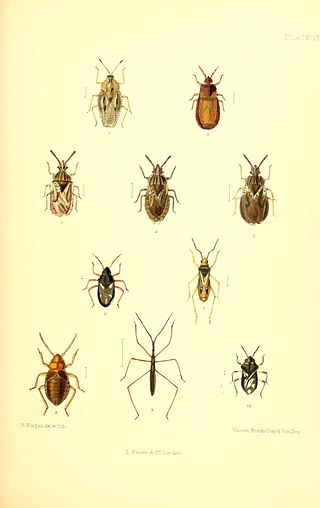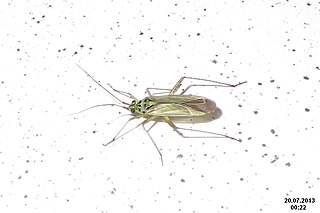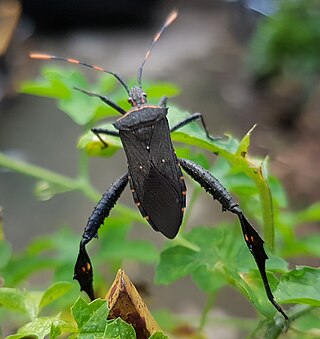
Velvet water bugs are members of the family Hebridae. They are semiaquatic insects that live among moss or ponds with an abundance of vegetation, in which they prey on small arthropods. Velvet water bugs are the smallest of the Gerromorpha, and have an appearance of tiny veliids. Hebrids sometimes move across water surfaces, but walk or run rather than skate or scull on the surface.

Hebrus pusillus is a true bug. The species is found in the Palearctic. It ranges from Europe and North Africa to Asia Minor, then east to Kirgizia. Hebrus pusillus is a tiny semi-aquatic bug which lives in wet places, such as small lakes, heath and fen ponds, often at the shore amongst dense vegetation or in Lemna or Sphagnum. In Denmark, England, Germany and Sweden it is univoltine.

Hebrus is a genus of velvet water bugs in the family Hebridae. There are at least 160 described species in Hebrus.
Pseudopsallus is a genus of plant bugs in the family Miridae. There are more than 20 described species in Pseudopsallus.

Orthocephalus is a genus of plant bugs in the family Miridae. There are more than 20 described species in Orthocephalus.

Myscelia cyananthe, the blackened bluewing, is a species of tropical brushfoot in the butterfly family Nymphalidae. It is found in North America.

Oncotylus is a genus of plant bugs in the family Miridae. There are at least 20 described species in Oncotylus.
Criocoris is a genus of plant bugs in the family Miridae. There are about 13 described species in Criocoris.
Celaenorrhinus fritzgaertneri, or Fritzgaertner's flat, is a species of spread-wing skipper in the butterfly family Hesperiidae. It is found in Central America and North America.

Alopecosa kochi is a species of wolf spider in the family Lycosidae. It is found in North America, including Canada, the United States, and Mexico.
Brechmorhoga praecox, the slender clubskimmer, is a species of skimmer in the dragonfly family Libellulidae. It is found in Central America and South America.
Aradus implanus is a species of flat bug in the family Aradidae. It is found in North America.
Anchonus is a genus of true weevils in the beetle family Curculionidae. There are more than 150 described species in Anchonus.

Brumoides septentrionis is a species of lady beetle in the family Coccinellidae. It is found in North America.
Hebrus buenoi, or Bueno's velvet water bug, is a species of velvet water bug in the family Hebridae. It is found in Central America and North America.
Xeranobium cinereum is a species of death-watch beetle in the family Ptinidae. It is found in North America.
Hebrus burmeisteri is a species of velvet water bug in the family Hebridae. It is found in Central America and North America.

Leptoglossus gonagra, known as the passionvine bug, citron bug or squash bug in different parts of its range, is a species of leaf-footed bug in the family Coreidae. It is found in Africa, the Caribbean, Central America, North America, South America, Southern Asia, the Pacific Ocean and Oceania.









